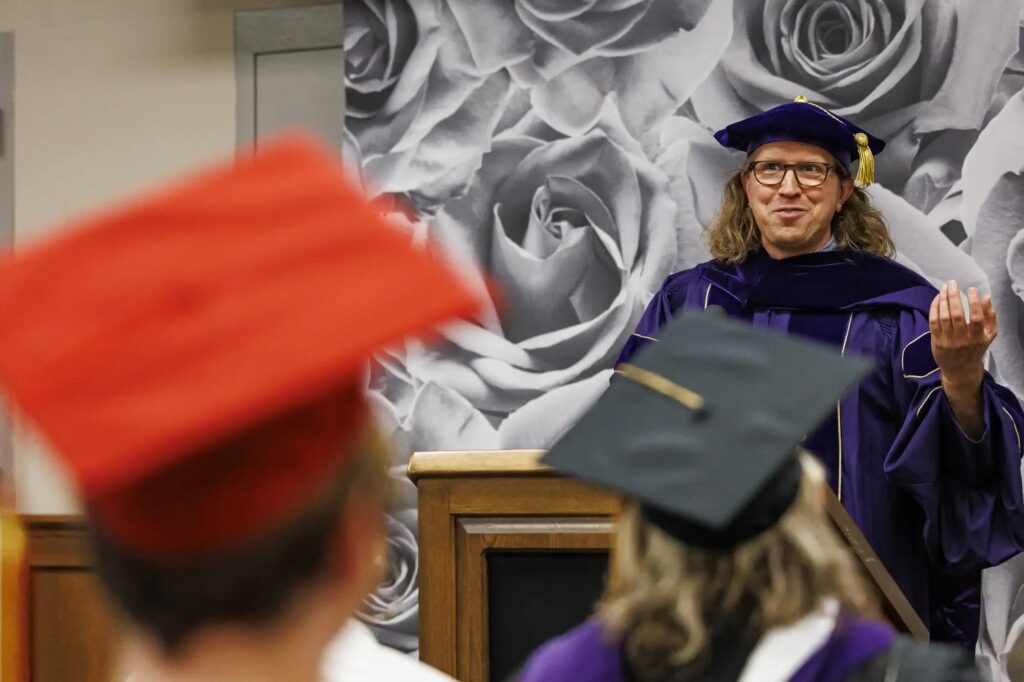
Overview
The TREC B.A. in Individualized Studies is organized into four problem- and place-based, inter- or trans-disciplinary “concentrations:” Law and Justice Studies; Science, Technology, and Health Studies; Markets and Communities; and Individualized and Interdisciplinary Studies. After students select a Concentration, they examine the methods and approach that some have used to attempt to address problems in their Concentration Area courses. In Capstone, students create an inter- or trans-disciplinary project that addresses a problem within their Concentration.
Concentrations
Law and Justice Studies
In the Law and Justice Studies concentration, students grapple with questions of structural violence, harm, and oppression and explore frameworks for repair. Students examine law in its broader historical, political, social, economic, and cultural contexts while critically interrogating the relationship between legal systems and justice. Students apply reading, writing, and analytical reasoning skills to address concrete problems that involve matters of law and justice. Potential career pathways for Law and Justices Studies concentrators include government and public services, non-profit and community based organizations, as well as continued graduate study.
Science, Technology, and Health Studies
Students in Science, Technology, and Health Studies integrate ideas, frameworks, methods, and data from the humanities and social sciences to understand the social, political, cultural, and historical contexts of science, technology, and health. Students use these tools to examine questions around individual and collective health, as well as questions about knowledge and research, technology and our built environments. By developing reading, writing, and critical reasoning skills, students are able to synthesize complex information and speak to both public and academic audiences. Potential career pathways for Science, Technology, and Health Studies concentrators include government and public services, non-profit and community-based organizations, as well as continued graduate study.
Markets and Communities
In the Markets and Communities concentration, students examine how economists, political scientists, philosophers and others have answered questions related to the distribution of goods and material necessities within markets. Students then make their own judgments about actually existing markets and communities and consider possible alternatives. Students will develop skills—including quantitative reasoning, technical writing, analytical thinking, and public speaking—needed to operate effectively in our current system of exchange while also cultivating critical and constructive imaginations that enable them to see beyond purportedly natural facts about who gets what, when, where, why, and how. Potential career pathways for Markets and Communities concentrations include for- and non-profit organizations as well as management-level positions within various industries.
Individualized and Interdisciplinary Studies
The Individualized and Interdisciplinary Studies program centers individual student needs and ambition, allowing students to create their own academic path. Since 1971, Individualized and Interdisciplinary Studies students have been able to design individual degree programs to meet their educational, professional, and personal goals. Each unique degree can be customized to build on what students have already learned and accomplished in school, work and in life. The Individualized Studies Bachelor of Arts degree reflects the original mission of Metro State University—to give students primary authority over and responsibility for their education.
Required Courses
Perspectives 301: Educational Philosophy and Planning
Students develop their “Degree Plan” in this semester-long course that introduces them to problem-based and place-based learning. The Degree Plan asks them to articulate why they are pursuing higher education, what, precisely, they are pursuing, and how their plan connects their past, present, and future learning. Although each student ultimately creates their own Degree Plan, they do this work together. Most concretely, this means they examine how others—scholars and practitioners as well as prior students and peers—have named and addressed problems; they engage in peer review; and they formally present their Degree Plans at the conclusion of the semester.
Perspectives 310: Interdisciplinary Conversations
Taken alongside PRSP 301, this course provides students the opportunity to hone their problem- and place-based Degree Plans by engaging the work of others who have identified a problem and attempted to address it in their respective communities.
Perspectives 499: Capstone
Capstone Projects are student-generated culminating projects that address a specific problem confronting them and/or their communities. The Project provides students a chance to develop a sustained line of inquiry or interest in greater depth than one would usually have during the course of a semester. Students pursue a Project that has been of enduring interest during the course of their undergraduate studies and/or beyond. This may take the form of a visual art project on tattoo-making in prison; it may be a resource guide for incarcerated fathers; it may be an autoethnography for kin; it may be a manifesto about the importance of harm reduction; it may be a policy brief about housing for people with criminal records; and so on. Capstone Projects are as diverse as TREC students.
Degree Structure
Total credits: 32 (minimum):
- Required courses: 10 credits
- PRSP301: Perspectives
- PRSP310: Interdisciplinary Conversations (2 credits)
- PRSP499: Capstone
- Concentration Area courses: 22 credits (minimum)
- Upper-division: 12 (minimum)
- Lower-division: any (no minimum or maximum)